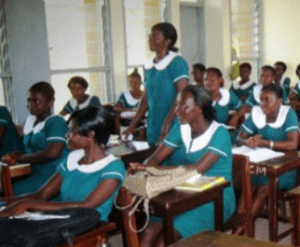GRNA now Ghana Registered Nurses and Midwives’ Association
 The Ghana Registered Nurses’ Association (GRNA) has by a majority stakeholder decision voted in a special resolution to change its name to Ghana Registered Nurses and Midwives’ Association (GRNMA).
The Ghana Registered Nurses’ Association (GRNA) has by a majority stakeholder decision voted in a special resolution to change its name to Ghana Registered Nurses and Midwives’ Association (GRNMA).
Mr Kwaku Asante-Krobea, President, GRNMA, who revealed this in Accra on Tuesday, said the change of name was in reflection to the interest of members who are both nurses and midwives.
“The change of name is technically effective as the GRNMA has completed all paperwork,” he said.
The GRNMA also commissioned its Greater Accra Regional Secretariat and Hostel, the Nurses and Midwives’ Plaza as part of activities that marked their 15th Biennial National Delegates Congress.
The conference, which was on the theme: “Higher Nursing and Midwifery Eduaction; Premium for Professional Excellence, Quality Care and Patient Safety,” was meant to review the performance of the GRNMA and strategies to meet the numerous challenges in health care delivery.
Mr Asante-Krobea said Nurses and Midwives constituted the largest number of health care professionals within the health care continuum in all settings, reaching at least 68 per cent among other valuable professional partners.
“To a large extent, nursing and midwifery contribution to health care influence the direction of the management of the disease burden across communities in the preventive, curative and rehabilitation domains, as we walk the tight rope in the performance of our functions,” he said.
He however admitted that tomorrow’s nurses and midwives would need a broad and integrated knowledge base, combined with an expanded repertoire of clinical, communication and interpersonal skills as well as ability to navigate social and ethical issues arising daily and in exceptional situations.
Mr Asante-Krobea therefore challenged modern day nurses to upgrade themselves to meet the expectations of their clients as well as save lives.
The president of GRNMA called on government to provide a safe working environment within which nurses work would be grossly compromised and also appealed to government to retain the allowances of the trainee Nurses and Midwives who filled many roles that represented the deficit created by the sharp nurse and patient ratio.
Colonel Vida Otoo, Director of Nursing, Ghana Armed Forces Medical Service, said the theme for the congress was appropriate and timely especially when much was expected of the 21st century nurse and midwife.
“And to meet these expectations he or she must be up-to-date on knowledge and skills,” she said.
Col. Otoo urged Nurses and Midwives to continue to update their knowledge, skills and attitude, adding “remaining up-to-date on knowledge and appropriate skills calls for higher education.”
“Today’s nursing workforce need to be more independent, innovative, and able to use higher levels of professional judgment and decision-making; assess and apply effective, evidence-based care safely and with confidence,” she said.
She advised Nurses and Midwives to be members, and often leaders, of multi-disciplinary teams who would provide leadership in promoting and sustaining change and developing clinical services.
Col. Otoo called for sponsorships, innovative ways of working, introduction of E-learning, provision of logistical support, attitudinal change, as well as the development of new competence among nurses and midwives in their works.
She appealed to Managers of the various health facilities to put in place measures that would help regulate how staffs are released to pursue higher education.
“This will ensure that higher education is not done to the detriment of patients care,” she noted.
Mr Alexander Segbefia, the Minister of Health, called for the ensuring of the capacity and competence of nurses to assess individual and community health needs to promote healthy lifestyles.
He noted that the Ministry had initiated measures to improve the capacity of nurses posted to deprived communities under the Community Based Health Worker Programme.
Mr Segbefia explained that this was to ensure nurses had control of such communities, while efforts to expand the nurse distribution ratio continued to help bring health care delivery to all communities.
Mr Segbefia reminded nurses of their professional oath towards selfless service.
He assured them that government would play its role of ensuring better service conditions, remunerations and other benefits to enable them contribute their quota towards quality health care delivery.
Source: GNA
